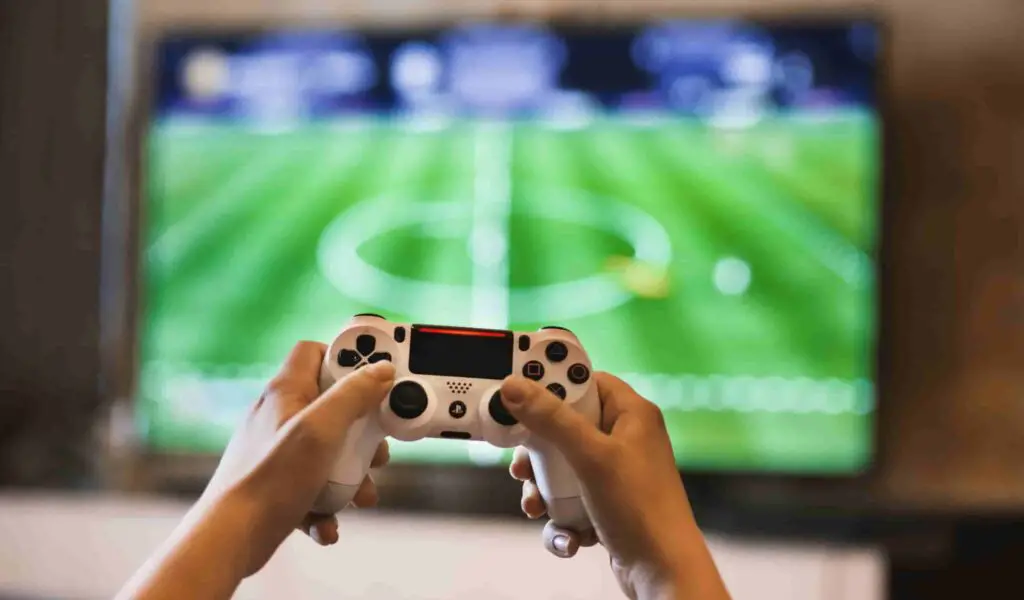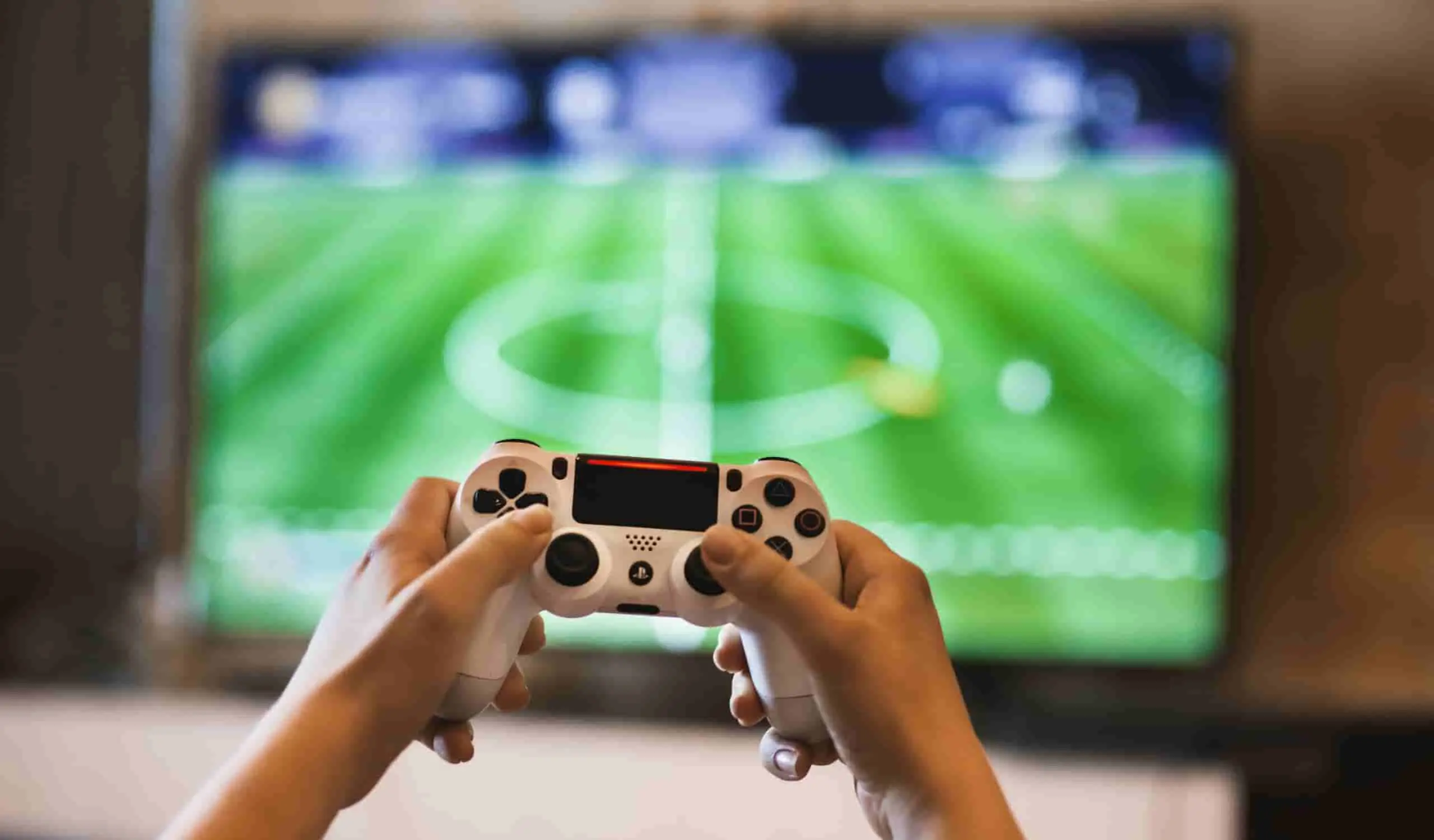What age is PS5 suitable for? – is one of the common questions of many parents after launching Sony’s latest PlayStation 5.
It is never too early to start thinking about your child’s health. One of the most important things you can do for them is to make sure they are getting enough physical activity.
But what age is PS5 suitable for?
PS5 offers tons of health benefits, but at what age should kids start using it? Keep reading to find out!

Table of Contents
What are PlayStation (PS) and PS5?
PlayStation (PS) is a series of home video game consoles developed by Sony Interactive Entertainment. The first PlayStation was released in 1994, and the latest console, the PlayStation 5, was released in 2020.
PS consoles are known for their high-quality graphics, immersive gameplay, and wide variety of games.
PS5 is the latest generation of PlayStation consoles. It was released in November 2020 and is a significant upgrade over the previous generation.
PS5 features a custom-designed AMD Ryzen CPU and AMD Radeon RDNA 2 GPU, which provide significantly improved performance compared to the PS4. It also features a new DualSense controller with haptic feedback and adaptive triggers, which provide a more immersive gaming experience.
PS5 is a great choice for gamers who are looking for the best possible gaming experience. It offers stunning graphics, immersive gameplay, and a wide variety of games. If you are looking for a new console, PS5 is a great option.
Also read: 30 Possible Negative Side Effects of Rebounding.
How To Restart Puberty Growth? Naturally & Authentic Way.
What are the health benefits of playing PlayStation?
It’s no secret that playing video games can have some pretty significant health benefits.
In fact, recent studies have shown that gaming can improve everything from hand-eye coordination to decision-making skills.
But what about playing PlayStation specifically? What sort of health benefits can you expect from this popular console?
- For starters, PlayStation gamers tend to have better reflexes than those who don’t play video games at all. This is likely due to the fact that PlayStation games require quick thinking and fast reflexes in order to be successful.
- Furthermore, PlayStation gamers also tend to have better problem-solving skills. This is likely due to the fact that most PlayStation games are quite challenging and require players to think outside the box in order to progress.
- Finally, gamers who play on the PlayStation tend to have better social skills. This is likely because gaming on the PlayStation often requires players to cooperate with one another in order to achieve success.
Ultimately, there are a variety of health benefits that come with playing PlayStation games.
So if you’re looking for a way to boost your brainpower, reflexes, and social skills, then pick up a controller and start gaming!

What age is PS5 suitable for?
The PS5 is suitable for all ages, but there are some games that may not be appropriate for younger children.
The game ratings are determined by the Entertainment Software Rating Board (ESRB) and range from E for Everyone to Adults Only (AO). You can check the ESRB ratings for any game before you buy it.
Here are some general guidelines for age-appropriate games:
- E for Everyone: These games are suitable for all ages. They may contain mild cartoon violence or fantasy violence, but they are not likely to be upsetting to most children.
- E10+: These games are generally suitable for children ages 10 and up. They may contain more violence or other mature content than E-rated games, but they are still not likely to be too upsetting for most children.
- T for Teen: These games are generally suitable for teenagers ages 13 and up. They may contain violence, language, or other mature content that is not appropriate for younger children.
- M for Mature: These games are not suitable for children under the age of 17. They may contain graphic violence, language, or other mature content that is not appropriate for younger children.
It is important to note that these are just general guidelines. Some children may be able to handle more mature content than others.
It is always best to talk to your child about the games they are interested in playing and make sure that they are appropriate for their age and maturity level.
In addition to the ESRB ratings, you can also use the parental controls on the PS5 to restrict access to certain games and content. You can also use the parental controls to set limits on playtime and spending.
Tips for using the parental controls on the PS5
Here are some tips for using the parental controls on the PS5:
- Create a separate account for each child. This will allow you to set different restrictions for each child.
- Use the age rating filter. This will prevent your child from playing games that are not appropriate for their age.
- Set a playtime limit. This will prevent your child from spending too much time playing games.
- Set a spending limit. This will prevent your child from spending too much money on games.
- Block access to certain features. You can block access to features like the internet browser, chat, and voice chat.
- Require a password for certain actions. You can require a password for actions like making purchases, changing settings, or adding friends.
- Monitor your child’s activity. You can check your child’s game history and see what games they have been playing.
- Talk to your child about gaming. Explain to your child why you have set certain restrictions and how they can earn more privileges.
By following these tips, you can help to ensure that your child has a safe and enjoyable gaming experience.
Here are some additional tips:
- Keep the parental controls up to date. Sony regularly releases updates that add new features and improve the parental controls.
- Use the parental controls as a starting point. You may need to adjust the settings as your child gets older and their gaming habits change.
- Be flexible. There will be times when you need to make exceptions to the rules. For example, if your child is playing a game with friends, you may want to allow them to play for a little longer than usual.
- Most importantly, be a good role model. Show your child that you enjoy playing games in moderation and that you can balance gaming with other activities, such as school, homework, and spending time with family and friends.
Keep in mind that the age rating for a game is not always accurate
When it comes to choosing games for your child to play on a PlayStation, it is important to keep in mind that the age rating on the game is not always accurate.
The age rating system is voluntary, which means that not all games are rated.
In addition, the rating system is not always consistent, which means that a game that is rated as suitable for children could still contain violence, gore, or sexual themes. As a result, it is always best to check the content of a game before allowing your child to play it.
You can find more information about the content of a game by reading its reviews online.
By taking the time to research the games your child wants to play, you can help to ensure that they have a safe and enjoyable experience on the PlayStation.
How do I know if my child is ready to play on a PlayStation?
Determining if your child is ready to play on a PlayStation or any gaming console involves considering several factors.
Here are some guidelines to help you assess your child’s readiness:
- Age and maturity: Consider your child’s age and maturity level. Younger children may struggle with complex controls or understanding game concepts, while older children may handle them better.
- Ability to follow rules: Evaluate your child’s ability to follow instructions and adhere to rules. Gaming often involves following specific guidelines, managing time, and respecting boundaries.
- Understanding of virtual vs. real-world: Ensure your child can differentiate between the virtual world of games and real-life situations. It’s essential to teach them about the impact of actions in games versus real-life consequences.
- Time management skills: Gaming can be immersive and time-consuming. Assess whether your child can manage their time effectively, balancing gaming with other responsibilities and activities.
- Content appropriateness: Review game ratings, content descriptors, and reviews. Consider your child’s sensitivity to violence, mature themes, or explicit content. Choose games that align with your family’s values and your child’s emotional maturity.
- Communication and online safety: If playing online, ensure your child understands online etiquette, the importance of not sharing personal information, and how to deal with online interactions.
- Parental supervision: Determine if you will actively supervise your child’s gaming sessions or if they can play independently. Younger children may require more supervision and guidance.
- Open communication: Establish open and ongoing communication with your child about gaming. Discuss boundaries, time limits, and responsible gaming habits. Encourage conversations about the content they encounter and any concerns they may have.
Remember, each child is unique, and the decision to allow them to play on a PlayStation should consider their individual readiness.
Regularly reassess and make adjustments as needed based on your child’s development and behavior.
Tips for helping your child have a safe and enjoyable gaming experience
Certainly! Here are some tips to help your child have a safe and enjoyable gaming experience:
- Set clear rules and boundaries: Establish guidelines for gaming time, content restrictions, and online interactions. Make sure your child understands and follows these rules.
- Familiarize yourself with gaming: Educate yourself about the games your child plays. Play together or observe their gameplay to understand the content and assess its appropriateness.
- Use parental controls: Most gaming consoles offer parental control features. Utilize these tools to limit access to age-appropriate content, set time limits, and manage online interactions.
- Encourage breaks and balance: Help your child understand the importance of taking breaks and maintaining a healthy balance between gaming and other activities such as physical exercise, socializing, and academics.
- Teach online safety: Discuss online safety practices with your child, such as not sharing personal information, using secure usernames, and being cautious when interacting with others online.
- Monitor and moderate online interactions: Stay involved in your child’s online gaming experiences. Monitor their interactions, encourage positive behavior, and address any concerns promptly.
- Foster responsible gaming habits: Teach your child about responsible gaming, including good sportsmanship, respecting others, and understanding the difference between virtual actions and real-life consequences.
- Encourage offline socialization: Balance online gaming with offline social activities. Encourage your child to engage in face-to-face interactions, join local gaming groups, or participate in multiplayer games with friends they know in real life.
- Maintain open communication: Create an environment where your child feels comfortable discussing their gaming experiences with you. Encourage them to share any concerns or negative experiences they encounter.
- Be a positive role model: We already mentioned it before. Display responsible gaming habits yourself, setting an example for your child. Limit excessive screen time and engage in activities that promote a healthy lifestyle.
By implementing these tips, you can help your child have a safe and enjoyable gaming experience while also fostering responsible behavior and maintaining a healthy balance in their lives.
Side effects of using too much PlayStation
Excessive and prolonged use of PlayStation or any gaming console can potentially lead to several side effects. It’s important to be aware of these and take necessary precautions:
Physical health issues:
Extended periods of gaming can contribute to sedentary behavior, leading to an increased risk of obesity, poor posture, and musculoskeletal problems.
Sitting for long durations without breaks may result in eye strain, headaches, and wrist or hand discomfort.
Sleep disturbances:
Late-night gaming sessions can disrupt sleep patterns, leading to insufficient sleep and fatigue.
The blue light emitted by screens can interfere with the body’s production of melatonin, a hormone that regulates sleep.
Neglect of other activities:
Excessive gaming can lead to neglect of important daily activities, such as schoolwork, chores, physical exercise, and social interactions.
This imbalance can negatively impact overall well-being and development.
Academic performance:
Spending excessive time gaming can affect academic performance and concentration. It’s crucial to establish a healthy balance between gaming and educational responsibilities.
Social isolation:
Overindulgence in gaming can lead to reduced face-to-face social interactions and isolation from real-life relationships.
It’s important to encourage your child to engage in offline social activities and maintain a healthy social life.
Emotional and psychological effects:
Some individuals may experience emotional and psychological effects from excessive gaming, such as irritability, mood swings, aggression, and difficulty managing frustration or disappointment.
To mitigate these potential side effects, it’s important to establish healthy gaming habits and set limits on screen time.
Encourage breaks, physical activity, and a well-rounded lifestyle. Open communication with your child about the importance of moderation and monitoring their gaming habits can also help prevent the negative consequences of excessive PlayStation use.
Some Related FAQs:
There is no definitive answer to this question, as it depends on a variety of factors such as the child’s maturity level and ability to control their gaming habits.
However, generally speaking, most children are ready for PS5 at some point between the ages of 8 and 12.
Of course, this will vary depending on the individual child, so it is important to monitor their behavior and make a determination based on your own observations.
Some tips for helping children to use PS5 responsibly include setting limits on screen time, monitoring their play habits and interactions with other players online, and encouraging them to engage in other activities and hobbies.
It is also important to emphasize the importance of good sleep, nutrition, and exercise for children’s overall well-being.
Additionally, parents should make sure to keep the PS5 hardware and games out of reach of young children who may be prone to putting things in their mouths.
Overall, keeping open and frequent lines of communication with your child is key to ensuring the responsible use of PS5.
Conclusion
So, what is the answer to the question of what age PS5 is suitable for? It depends on the games.
The suitability of the PlayStation 5 (PS5) for a specific age group depends on the games played rather than the console itself.
While the PS5 does not have a specific age rating, the games available for the console come with age ratings provided by organizations such as the ESRB or PEGI.
Parents or guardians should review and consider these age ratings and content descriptors when determining if the PS5 is suitable for their child.
Some games are appropriate for all ages, while others may contain mature themes, violence, or explicit content more suitable for older players.
It is crucial to exercise parental guidance and make informed decisions based on a child’s age, maturity level, and sensitivity to game content.
Additionally, fostering open communication and monitoring gameplay can ensure a safe and enjoyable gaming experience for children of various ages on the PS5.


